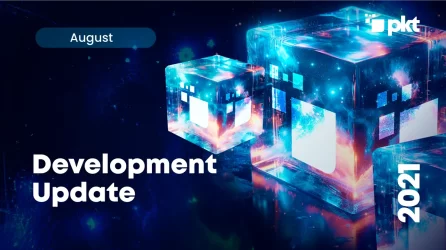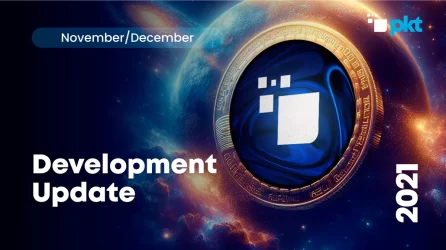
As August 2021 wraps up, the PKT community is growing at a remarkable rate. There are many notable milestones and achievements to share.
PKT is an open-source project. All of the PKT blockchain code and the various projects being developed in the ecosystem are managed by contributing community members.
The PKT Cash blockchain mainnet turned 2 years old on August 20, 2021. This marks a special milestone because it coincides with some exciting stats. PKT Network crossed the threshold of 100 Gbps of sustained bandwidth. This figure is based on the collective ingest from the 3 dominant mining pools: Srizbi ~45 Gbps, PKT Pool ~35 Gbps, and PKT World ~25 Gbps totaling ~105 Gbps. To put this type of bandwidth in perspective, Helium’s 140,000 hotspots are pushing ~33 Gbps, which means the PKT Network is now 3x more powerful than the Helium Network. Additionally, PKT Network’s bandwidth throughput has grown by approximately 2x over the past 45 days. This growth is based on increased announcement mining from the Akash community, growing awareness for the PKT project, and pool infrastructure upgrades now capable of handling the bandwidth growth.
Over the past month, mining difficulty has been oscillating between 9m and 10m. This difficulty retargeting is expected to extend and sustain above 10m in the coming days. As of the end of August 2021, over 3.227B coins have been mined representing 53.7% of the total coin supply. It will take 61 more years for the remaining 2.723B coins to be mined. It’s also notable that more than 390m coins have been burned, which represents 12% of the total mined coins to date and 6.5% of the total coin supply. The PacketCrypt protocol burns coins when the Network Steward wallet doesn’t grant its treasury funds within a trailing 90 day period.
The next decimation will take place in October 2021, on block 1,152,000. This is approximately 70,000 blocks from the date of this post. A decimation occurs every 100 days and reduces the 60 second block reward by 10%.
The PacketCrypt proof of work continues to evolve with input from the community. In August, a pull request from community member Devious0 was merged in the PacketCrypt_rs master v0.4.4, which improved the mining code to facilitate more efficient announcement uploading. This update positively impacts the stability of the PKT Network and paves the way for servers with increased mining power to upload their announcements faster.
There is continuous active development of PKT wallet technology, with numerous notable projects in the works. In August, the PKT World pool graciously delivered on its promise of a Windows-based desktop PKT wallet that can also mine PKT. This is a fantastic update because Windows users can now easily deploy their desktop CPUs towards PKT mining without needing additional hardware, or to rent a server. Currently, Windows users can simply download the wallet, easily set up a PKT receiving address and begin mining. The performance of the built-in miner will be improved in the coming period, with the intention to build a linux version as well. PKT World is also working on lightweight mode, so the wallet doesn’t need as much resources as a full node wallet. The PKT World website will also get an updated blockchain explorer function in the future.
The second notable update is that the first PKT mobile wallet is working towards phase 1 completion. This mobile wallet is being developed by AnodeVPN so that the mobile wallet can later become the AnodeVPN app. The mobile wallet UX is complete, with standard wallet functionality uses the 15 word seed standard. Before the wallet can begin alpha testing, Lightning Network integration must be finalized, which will enable fast micro-transaction functionality. In the months after the initial mobile wallet release, users will receive a software update that will enable the VPN features.
Obeah Bridge (ODApp) has completed development of the swap technology between PKT Cash and wPKT on Binance Smart Chain (BSC). This is a community member funded and privately developed technology that will officially connect PKT to the world of DeFi. The community will be notified when the wPKT smart contract is open for public trading in September 2021, assuming no last minute changes.
When live, PKT Cash holders can use ODApp to convert PKT to wPKT on a 1:1 basis. ODApp will assess a flexible fee ranging between 1% and 3.5% each time the bridge is used. When PKT is swapped for wPKT, the PKT Cash will be securely stored between hot and cold wallets operated by ODApp, called “The Vault.” More details on the ODApp technology will be shared in another blog post that will go live soon.
When wPKT launches it will be a significant milestone for the PKT project, because this represents the first global liquidity event for PKT Cash. The operable wallet for wPKT will be MetaMask, which is available as a browser extension for desktop, as well as and mobile use. It is recommend to set up your MetaMask wallet if you plan to swap to wPKT. Additionally, the ODApp team is now building a bridge between BSC and Ethereum, and will be looking towards bridging to Polygon (MATIC) and Solana (SOL) in the coming months.
One of the largest catalysts for community growth in August was Akash Network announcing its support for PKT mining to their community of more than 40,000 people. Akash is a decentralized cloud infrastructure network, comprised of significant CPU compute resources. Their team created a blog post covering the costs and yields while mining PKT on Akash and encouraged both the Akash and PKT communities to utilize their crypto-friendly resources to monetize bandwidth and expand both networks. The results have been staggering, with Akash’s available 10 core servers selling out within 7 days after the announcement. Akash has been busy expanding their inventory as well as continuing to do performance testing. The Akash community has been very supportive of PKT and it’s wonderful to welcome so many new people into the PKT ecosystem.
The TokenStrike project is in ongoing development with Alex Lightman’s talented development team. During August, significant work was completed in determining the architecture of TokenStrike, including structures for TokenStrike blockchains and data storage. TokenStrike will also have operability with the Lightning Network to ensure scalability, fast transaction speeds, and maximum transactional throughput.
TokenStrike is one of the cornerstone technologies on the PKT roadmap. Not only does TokenStrike enable anyone to issue near-zero costs tokens and NFTs in the PKT ecosystem, but it’s the foundational technology that will tokenize bandwidth, and make it so people can trade their bandwidth tokens in a decentralized bandwidth trading marketplace with near zero cost. This is a scalable solution that, when combined with the Cloud ISP and cjdns technology, will set PKT apart from every other layer 1 blockchain in the world.
Bandwidth “at the edge” is a vital part of the PKT roadmap. PKT is focused towards harnessing and repurposing bandwidth because it is a valuable resource that can improve internet service quality, but which most internet subscribers are wasting the majority of the day. PKT Pal is a community member company that has built a turnkey solution called the PKT Cube that enables non-tech savvy internet subscribers and dedicated PKT community members to monetize their unused internet bandwidth at their home or office. The PKT Cube is listed at $2,799, but is currently selling at $2,499, which is $300 off it’s retail price. There is also another $100 discount for available when a friend purchases. The PKT Cube is a powerful 16 core AMD Ryzen 9 5950x processor that comes preloaded with the PkteerOS software, securely pairs with the user’s mobile device using an encrypted key pair, and enables the user monetize their home or office bandwith. PkteerOS also provides access to send and receive PKT from a mobile device, and includes dashboard analytics such as daily yields, bandwidth metering and encryption (Ke/s) data.
The PKT Cube will soon provide access to PKT Pal’s Bill Pay functionality, where users can pay their bills with PKT Cash. The PKT Cube will also support forthcoming roadmap technologies and ancillary permission revenue sources, including VPN via AnodeVPN and eventually local wifi sharing. The first PKT Cubes will begin shipping in September 2021.
PKT Pal has also begun developing the PKT Mini, which is a smaller and lower cost device that will run PkteerOS with a price point of between $199 and $299. The PKT Mini will mine PKT and provide all the dashboard features, but with less CPU power. The PKT Mini is expected to launch in Q1 2022.
While PKT Pal is the first Edge Point device, it’s believed there will be numerous Edge Point device offerings in the ecosystem in the near future. The essence of PKT is to enable entrepreneurs and businesses to build successful companies that carry out the PKT technology roadmap. It is encouraged to embrace these community member businesses, as those operators are who are carrying out PKT technology roadmap and are the people who will drive marketing dollars, awareness and commerce into the ecosystem for the benefit of all.
The project Anodium VPN is continuing its active development on Milestone 3. The focus is Lightning Network integration, as this open source technology is fundamental to TokenStrike and PKT VPN. What differentiates PKT VPN from all other VPN projects is that it’s completely free to use. It is the philosophical belief within the PKT project that if there’s idle internet capacity, people should have access to the internet for no cost. Beyond that, if people require a certain quality of service, they should be willing to pay for the speed they require.
The open source Anodium VPN technology is planned to be used within the AnodeVPN app. People will get a baseline VPN for free, and only pay for the network speed they want, when they need it. Users will be able to choose from user-rated VPN services in an open market, and will only pay for their VPN when they are using it. The hope is that if VPN is free, people will begin to take their privacy and security more seriously. Additionally, if VPN services can be fast, then when high speed internet access is required, people can pay for network speed using with PKT Cash. When people can utilize the PKT Cash they earn from mining to secure and speed up their internet connections, then even a larger amount of people will use VPN technology. AnodeVPN leverages a functionality called cjdns keys, so people can get VPN access without providing their name, email or phone number.
The PKT community project continues to organize, now 5 months after the initial 90 day PKT Community Network Steward project term. There is still one more outstanding Network Steward project deliverable, which is the 90 second explainer video. This video is currently completing animation and voice over. However, a growing group of dedicated community members has banded together to self fund communications, publicity, community moderation and content creation for the PKT social channels. There is also a dedicated professional team called Ninja Promo, that has been engaged on a monthly-basis through this community funded initiative, to support the community growth, moderation and communications efforts.
Alas, September is the month for listing. As mentioned above, the ODApp bridge to BSC enables wrapped PKT ($wPKT) to list on the PancakeSwap DEX. This will be the first global liquidity event for PKT Cash ($PKT). Subsequently, PKT will be listed on a Top 15 CEX. The CEX technical integration process is currently underway and once that is completed there will be specific visibility on the launch date. It must be noted that PKT is a first-of-its-kind layer 1 blockchain, which has required extra work to onboard to the exchange since this is the first time that the PacketCrypt proof-of-work is being integrated with a CEX. However, the listing team is on the home stretch of this process. Included in the CEX listing deal is support for a robust communications and publicity strategy once the coin is live trading.
The 3 major pools on the PKT Network have been working tirelessly to upgrade their infrastructure to support the fast-paced scaling of the network.
Srizbi is now live with its anycast setup in both Vienna and Naaldwijk. They’re also adding additional dark fiber redundancy between Naaldwijk and Vienna over Nuremberg and Prague to mitigate against future implications caused by fiber cuts on the main path between Frankfurt and Munich. Srizbi has scaled its capacity to handle approximately ~100 Gbit/s of announcement mining bandwidth at a difficulty of 1024. They are capable of ingesting 3-4 Terabit/s, and can move up to 200 Gigabit/s into their block miners. As of the end of August, the Srizbi pool is averaging ~44 Gbps with peaks of ~51 Gbps.
These upgrades increased redundancy, reliability and also capacity in preparation for the upcoming months. Srizbi also now has enhanced efficiency to support a large part of Europe, which sets the stage to support new services and technologies that utilize PKT infrastructure in the near term, such as VPN exit points. Srizbi has also been working on its new dashboard which will provide enhanced analytics viewing, as well as a grouping feature for managing miners. This software is expected to become available in September.
PKT Pool and PKT World have also been scaling infrastructure with current bandwidth capacity of ~35 Gbps and ~25Gbps respectively.
The Network Steward is a mechanism built into the PKT blockchain whereby 20% of every coinbase is paid into the Network Steward wallet, which is used to fund grants towards PKT initiatives such as technology and infrastructure development.
In June 2021, a grant proposal was accepted to create a User Operated Internet Fund. This fund is being administered by NLnet, which is a well renowned philanthropic organization. NLnet will finance, facilitate, and supervise micro-grants through the fund towards development teams committed to build technology that support the PKT vision of internet by the people, for the people.
The fund is open for grant proposals every 2 months, with a 2 month long submission window. There is a final notice of acceptance 6 to 8 weeks after the call deadline for each period. The current call is open as of August 1, 2021 with a submission deadline of October 1, 2021. The max grant to any one person, or entity, is 50,000 EUR for a first project. Higher denominations are considered on a case-by-case basis for entities who have already successfully completed one or more projects.
Projects are evaluated based on their technical merits, expected impact/strategic relevance and overall value for the grant request. Expert reviewers will judge each project using a 7 point Likert-type scale as such:
Technical excellence/feasibility (30%)
Cost effectiveness/Value for money (30%)
UOI Relevance/Impact/Strategic potential (40%)
It is highly encouraged to closely monitor the User Operated Internet Fund website at: https://nlnet.nl/useroperated/. As a general call to developers, the PKT community is encouraged to use this fund and its resources to help support the PKT project and build the PKT roadmap.
As the notoriety for PKT grows, it is expected that developers will support the PKT project. The Network Steward is designed as a mechanism for those developers to get paid for contributing their skills and innovation towards the PKT vision of decentralizing access to the internet, lowering the costs of bandwidth and getting the next 1 billion people on line.
Until next time.
Jesse Berger
Community Member
Go back to Blog →
Updates
This update will cover PKT technology development progress through November & December 2021. PKT is an open-source project. All of the PKT blockchain code and the various projects being developed…

Updates
PKT Lightning Daemon (PLD) Caleb James Delisle is the lead dev for PKT and shared some big updates for the upcoming PKT Wallet technology, including the PKT Lightning Daemon (PLD)…